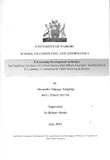E-learning development in kenya an empirical analysis of critical factors that affects learners' satisfaction in e-learning in institution of higher learning in kenya

View/
Date
2012Author
Ndigirigi, Alexander N
Type
ThesisLanguage
enMetadata
Show full item recordAbstract
The trend of using e-Iearning as learning and lor tool is rapidly expanding in education sector
both in developing and developed countries. In Kenya e-Iearning has been adopted in both
private and public institutions of higher learning. Although there is tremendous growth in elearning
both in developed and developing countries the demand for learning is increasing
rapidly. This have prompted researcher to research on different aspect on learners' satisfaction.
This study has analyzed different models and extended Technology Acceptance Model (TAM)
which was used to investigate the underlying factors that affects learners' satisfaction in elearning.
The developed model covered three dimensions namely: course management dimension,
technology dimension and institution arrangement dimension. The model was populated by data
gather from a survey of 337 learners (diploma, undergraduate and post graduate learners) from
University of Nairobi, Kimathi University and Inorero University. The model was estimated
using structured equation modeling (SEM). A path model was developed to analyzed
relationship between the factors to explain learners' satisfaction toward e-Iearning. The result
showed that course management dimension (instructor factor and course factor) had a strong
effect to perceived usefulness. Technology dimension (software quality and internet quality)
showed a strong significance to perceived usefulness and perceived ease of use. Institution
management dimension (diversity in assessment and interaction with other) also showed a strong
effect to perceived ease of use.
This paper contributes to literature and research on factors that affects learner's satisfaction in elearning.
The paper proposes further research for learners with special needs and learner who are
undertaking e-Iearning tailor made professional course. Also future research can be done where
score card will be included as a dependent variable.
Citation
Masters of Science in Information SystemsSponsorhip
University of NairobiPublisher
University of Nairobi School of Computing and Informatics
